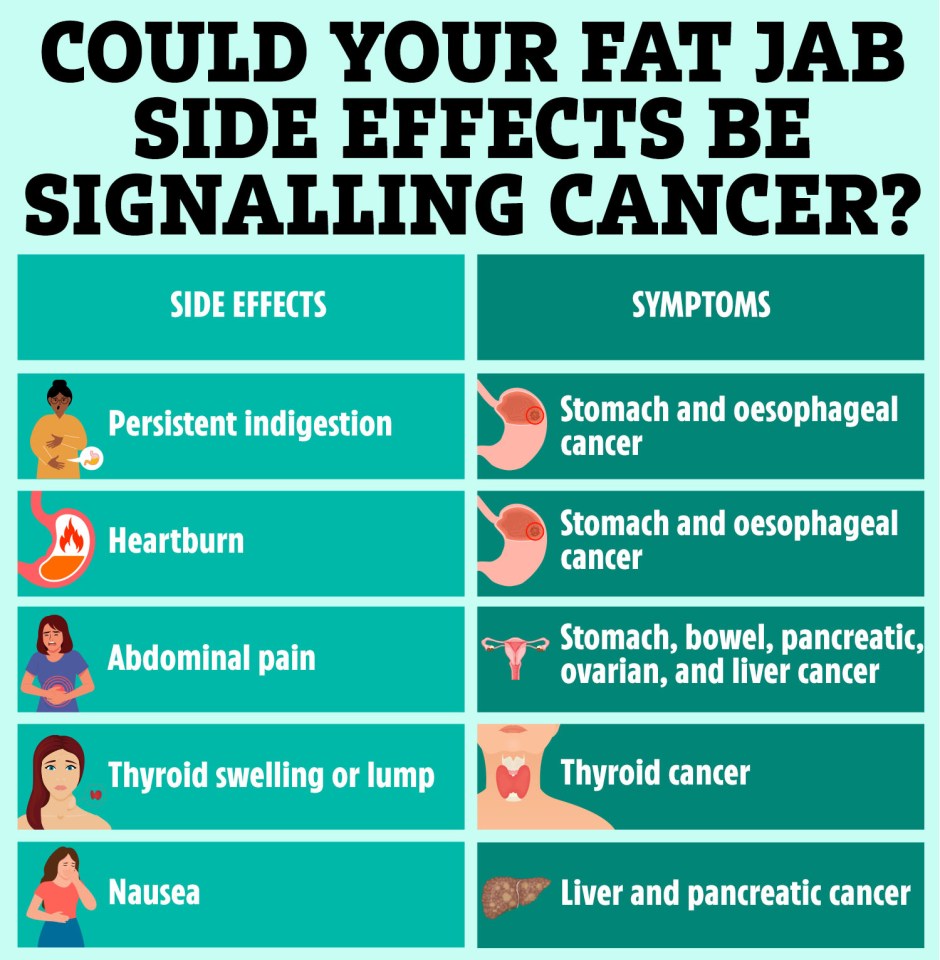ALL medications, including prescription drugs, over-the-counter medicines, and even herbal remedies, have the potential to cause side effects.
But experts have warned weight loss jab users to pay real attention to any side effects they experience, as they could actually be signalling deadly cancer, as Dawn Clegg tragically found out.
The 51-year-old, from Morecambe, Lancashire, had been using Mounjaro to treat her diabetes, but in March this year, she began suffering from chest pain, which she initially put down to a side effect of the jabs.
When the pain persisted, she headed to A&E before doctors made a shocking discovery.
After undergoing several X-rays, doctors spotted shadows on her lungs, kidneys and breast, and she was diagnosed with soft-tissue cancer, known as sarcoma.
Dawn was then given the life-shattering news that she had less than a year to live.
Her heartbroken husband, Arron Clegg, 51, is planning to hold a “living wake” in November to celebrate the life of his wife.
He said: “We were devastated on hearing news of cancer in these areas – there is no cure and she is now terminal.”
Weight loss expert at The Lagom Clinic, Dr Jack Ogden, said he has also been made aware of a fat jab user mistaking symptoms of cancer for side effects, though they weren’t linked to the clinic.
He tells Sun Health: “As a clinician, hearing about cases like this is always sobering. It reinforces how easy it is for both patients and healthcare professionals to attribute symptoms to the most obvious cause.
“In this case, weight loss injections, when something more serious may be underlying.”
The fat jab user, a 52-year-old who remains anonymous, began experiencing persistent fatigue, feeling full quickly, and mild nausea while on a GLP-1 weight loss injection.
They initially assumed these symptoms were routine side effects, but they persisted beyond the expected two to three-week adjustment period.
Further investigation by their GP revealed a diagnosis of stage two stomach cancer – which isn’t very common in the UK but can be deadly.
When detected early, stomach cancer has a high chance of being cured.
But it’s often diagnosed at a more advanced stage, which makes it harder to treat and means survival rates can be low.
Dr Ogden said: “It’s important to monitor persistent symptoms, keep a log of side effects, and seek prompt medical advice if anything unusual arises.”
So what cancer symptoms could people mistake for the side effects of fat jabs?
Here, a team of experts offer their life-saving advice…
THE SYMPTOMS YOU MUST NOT IGNORE
THERE are more than 200 different types of cancer, and they all have different signs and symptoms.
While some affect specific areas of the body, symptoms can be more general and similar to those caused by less serious conditions or medication side effects.
Superintendent pharmacist at pharmica.co.uk, Ana Carolina Goncalves, said symptoms such as persistent indigestion, heartburn and abdominal pain are potential side effects of weight loss injections, but could also be signs of liver, bladder, pancreatic or stomach cancer.
She says: “Thyroid swelling or a lump in the neck might be dismissed as an injection side effect, but it could also indicate thyroid cancer.
“The risk of thyroid swelling has been confirmed as a potential side effect by the manufacturers of both Mounjaro and Wegovy.
“And nausea is another common side effect of weight loss jabs that can also indicate liver, bladder or pancreatic cancer.
“There’s a lot of overlap between the symptoms of different organ cancers (like liver and pancreatic cancer) because they affect similar areas of the body.
“This can make identification of cancer symptoms difficult, especially when side effects of weight loss injections are also present.”
It’s also important to note that while use of the jabs results in weight loss, sudden, unexplained, unintentional, and significant (more than 5 per cent of your body weight in six to 12 months) weight loss could be a red flag for cancer.
HOW TO SPOT THE DIFFERENCE
THERE’S not always an easy way to tell the difference between cancer symptoms and weight loss side effects.
It depends on the symptoms you experience, says Ms Goncalves.
She explains: “High levels of acid reflux or heartburn that persist even after you’ve stopped weight loss injections should definitely be looked into by a doctor or GP.
“Also, a lump in the neck, hoarseness, or difficulty swallowing could indicate thyroid cancer.
“It’s not possible to fully tell on your own, so you should consult your doctor or GP if you experience these symptoms.”
WHAT’S THE RISK?
KEVIN Joshua, clinical lead at Juniper, an online healthcare provider, says while it’s not very common, confusing symptoms and side effects are a real risk.
He warns: “The danger is that someone may put persistent or worsening symptoms down to the medication, rather than seeing their GP.
“That missed time can make all the difference in cancer treatment and survival.”
Ms Gonclaves adds: “Cancer caught early is far easier to treat. If people assume ongoing pain, nausea or weight loss is just a side effect, they may only get checked once the cancer is more advanced – and that can be life-threatening.
“Given the increasing use of weight loss injections in the UK, the potential for confusion is likely growing, especially for cancer symptoms that overlap with common injection side effects.
“However, there’s currently no large-scale study that estimates how frequently cancer symptoms are misattributed to jabs.
“But it’s important to note the safety of Wegovy and Mounjaro has been proven in clinical trials, and they are licensed by the Medicines and Healthcare products Regulatory Agency (MHRA) for weight management in the UK.”
WHAT SHOULD YOU DO?
IF you experience any symptoms after starting weight loss jabs, Dr Ogden recommends you do the following:
- Track your symptoms – keep a daily log noting timing, intensity, and duration.
- Monitor persistence – common side effects usually settle within two to three weeks.
- Note severity changes – sudden worsening or new symptoms are red flags.
- Consult a healthcare professional promptly – don’t wait to see if symptoms pass if they are unusual or severe.
- Communicate openly – share your symptom log with your GP or specialist for accurate assessment.
Weight loss injections can be safe and effective, but awareness and careful monitoring are essential, added Dr Ogden.
“Early detection of serious issues can save lives and prevent complications.”
The majority of common side effects, such as nausea, diarrhoea, vomiting, skin redness or fatigue, can be managed with adequate hydration, dietary choices, and over‑the‑counter medication.
Ms Goncalves advises: “You can try eating smaller meals, and using herbal teas or oral rehydration salts to alleviate gastrointestinal symptoms.
“You should drink fluids regularly to ensure you are hydrated.”
But you should seek medical help if symptoms are severe, continue for more than a few weeks, or are linked with alarm signs like vomiting blood, blood in stools, jaundice, unexplained weight loss or a lump.
“These should never be written off as ‘just the jab’,” said Mr Joshua.
THE MOST COMMON CANCERS IN THE UK TO BE AWARE OF
THE most common cancers in the UK are breast, prostate, lung, and and bowel cancer.
Breast cancer is the most common cancer in the UK, affecting both men and women but far more common in women.
Symptoms include a new lump or thickening in the breast or armpit, changes in breast size or shape, nipple changes like inversion or discharge (especially with blood), skin changes such as dimpling, redness, or a rash, and persistent pain.
Prostate cancer is the most common cancer in men.
Symptoms primarily involve urinary and sexual issues, such as frequent or urgent urination (especially at night), difficulty starting or stopping urine flow, a weak stream, and a feeling of incomplete bladder emptying.
Lung cancer is a leading cause of cancer deaths in the UK, linked to smoking.
Common lung cancer symptoms include a persistent cough, coughing up blood, breathlessness, an unexplained cough that gets worse, chest pain or ache, recurring chest infections, and unexplained weight loss or fatigue.
And bowel cancer is a common cancer affecting both men and women.
Symptoms can include a persistent change in bowel habits, blood in your poo or bleeding from the bottom, unexplained weight loss, unexplained tiredness, and a pain or lump in your tummy.
Early diagnosis can significantly improve outcomes for most cancers, so if you experience any of these symptoms, see your GP.




